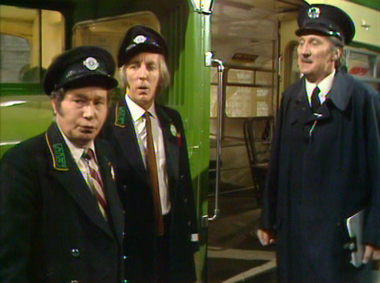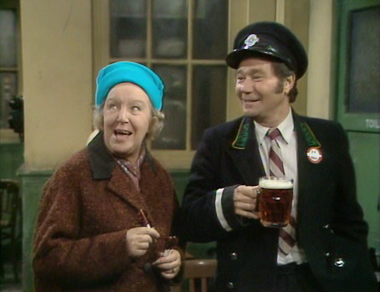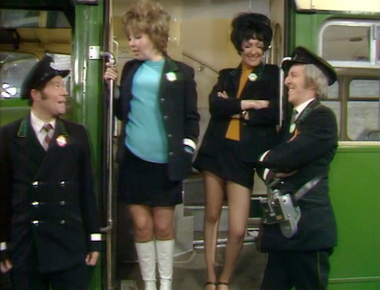
 |
|
|
|
Devised and scripted for London Weekend Television by Ronald Chesney and Ronald Wolfe (who had enjoyed earlier success with The Rag Trade), On the Buses is a classic British television sit-com from the late 1960s/early 1970s. The show focuses upon the concerns and cultural practices of a distinctly working class group of characters. As such, the series explores and expands upon -- albeit in often hilariously funny ways -- themes encountered in British New Wave films like Saturday Night and Sunday Morning (class-based workplace antagonisms) and A Kind of Loving (married couples sharing a home with their in-laws and/or extended family). The general tone and giddy nature of the show -- along with its employment of saucy double-entendres -- brings to mind contemporaneous Carry On films at times. Humour that is by turns earthy, broad, clever, physical, sympathetic and cruel -- and, on occasion, a little politically incorrect and slightly vulgar -- abounds here. 
The series is undoubtedly a product of its time but the laughs flow thick and fast, thanks to the quality of the show's scripts and the spot on delivery and comic expertise of its regular cast members. It's also worth noting that over the course of the series the regular cast received great support from a veritable army of well-known faces (Yootha Joyce (Die! Die! My Darling!), Wendy Richards (Are You Being Served?), Norman Mitchell (A Home of Your Own), Bob Todd (The Benny Hill Show), Helen Fraser (Billy Liar), Nosher Powell (Eat the Rich), Kate Williams (Love Thy Neighbour), et al) who appeared in one-off episodes here and there. Unfolding over seven series that ran between 1969 and 1973 (a whopping 74 episodes that are each roughly 25 minutes in length), On the Buses features a number of well-drawn recurring characters while providing a good variety of locations for them to operate within. The main narrative thrust of the series is centred around the bus driver Stan Butler (Reg Varney) and his regular conductor and best friend Jack Harper (Bob Grant), who work for the Luxton and District Traction Company. Diminutive, cheeky and chirpy but ultimately easily-led, Stan is an almost-middle-aged, resolutely working class, Jack-the-lad who still lives at home with his old Mum (Cicely Courtneidge in series one, Doris Hare thereafter). Much taller than Stan but of a similar age, the skinny and hawk-like Jack is a militant and sarcastic union rep with a cruel and vicious streak. There's obvious visual humour to be had in the pairing of tall and short comedians here but there's a great comic chemistry present between Varney and Grant that amounts to much more than slapstick sight gags and crude quips: Varney and Grant's expressive acting generates a real sense of pathos on those occasions when hard-nosed Jack callously lets Stan take sole blame for their joint misdemeanours. Stan and Jack have three main interests in life: pulling birds (invariably female conductors), skiving on the job and making illicit use of the bus depot's resources (paint, welding gear, the buses themselves, etc). The randy pair openly treat every good-looking female they meet as a sex object and Jack possesses a lecherous leer and a toothy dirty laugh that makes Sid James in full-on Carry On mode look and sound like a choirboy. Numerous critics have passed comment on the unlikely nature of Stan and Jack's pursuance of -- and success with -- attractive mini-skirted women who are seemingly half their age. In the book British Low Culture (1998), Leon Hunt suggests that this aspect of the series is an example of what he dubs "permissive populism", which can be defined as mainstream popular culture's belated acceptance and articulation of ideas pertaining to the late 1960s notion of the permissive society. Hunt also supplies interesting observations concerning the construction of gender boundaries within the show. Stan and Jack's activities necessarily bring them into conflict with their officious supervisor, Inspector Cyril Blake (Stephen Lewis). Gangly, awkward and dour, -- and bedevilled by numerous nervous tics -- Blake (invariably referred to as Blakey, Hitler or Dracula by the disrespectful duo) is tasked with ensuring that the buses run to time and that the drivers and conductors act in a professional manner. Needless to say, Blakey has his work cut out for him when he's dealing with Stan and Jack. By taking the job of Inspector, the working class but learned Blakey is judged to have betrayed his class and Stan and Jack go out of their way to make life hard for him. Blakey is overly fussy when we first meet him but, as the series progresses, the cruel tricks that Stan and Jack play on him -- and the resultant physical injuries and emotional hurt that he subsequently suffers -- become so spiteful and dangerous that we cannot help but sympathise with him a bit. 
As with the onscreen indignities and injuries visited upon Oliver Hardy's characters, Blakey's suffering is always prolonged for maximum torturous effect: there's always one further whack or knock to a painful injury to be had and Blakey's pitiful cries of "I 'ate you, Butler" are heard more regularly as the series progresses. However, the show's internal sense of morality often results in the hapless Stan getting his comeuppance, be it for hurting or offending Blakey or naively following Jack's usually ill-judged advice. As such, Blakey occasionally gets the last laugh and when he does, he does so with sadistic relish. Out of working hours, the show's action relocates mainly to Stan's house, though raucous social gatherings at the bus depot's canteen and social club figure prominently, as do trips to local pubs and the like. On the home front, Stan's old Mum is the matriarch of the family. Sweet but canny and controlling, she knows how to play on Stan's emotions and she has no qualms about making him feel guilty if his loyalties (and the contents of his pay packet) appear to be straying beyond her household. Doris Hare went on to play a similar mother figure in the smutty Confessions films starring Robin Askwith. Also living in the Butler household is Stan's younger sister Olive and her husband Arthur. Naive, plump and prone to suffering from a variety of minor but inconvenient ailments that prompt comical comment (blocked sinuses, travel sickness, corns, rashes and the like), Olive sports bottle bottom glasses and tends to be the butt of Arthur's cruel jibes. Arthur is more cultured and educated than the Butlers and he generally adopts the role of a pseudo-intellectual snob. He also fancies himself as a bit of a hard man and he often threatens Jack and Stan with physical violence when their scams go awry. Arthur takes pride in being a skinflint and a killjoy and he happily lets the cash-strapped Stan cover most of the family's living expenses. The Butler household is a location where some of the show's funniest scenarios play out. The comic antagonisms present between Arthur and Olive and Arthur and Stan work well and the way that Mum uses emotional blackmail to manipulate Stan grants him our sympathy on some occasions. He's essentially a good lad who will go out of his way to please his mother and his sister and they know this. Consequently, the Butler household is the site of some of Stan's most crushing disappointments: his regular attempts to sneak girlfriends into the house or to find some privacy there invariably fail thanks to Mum and Arthur's dogged interference. The various scenarios that involve Stan and his latest date being disturbed by somebody entering a room unannounced are played out in the classic British comic farce tradition. On more than one occasion the Butlers are so cash-strapped that they are forced to take in lodgers (usually visiting managers or nurses from the bus depot), which usually leads to class-based conflict and comedy of manners inspired laughs. Similarly, visits from extended family members also lead to strained relations and humorous scenarios. When Arthur divorces Olive and Stan leaves home (and the show) towards the end of the series, Blakey moves in as a full-time lodger and he essentially replaces Arthur as Olive's chief critic. When Stan leaves, more is made of the fact that Jack now lives next door to the Butler household. This allows Jack to torment Blakey both at work and at home and Blakey starts getting drawn into Jack's scams in the same way that Stan used to. To make things worse for Blakey, an intolerant manager figure (Michael Sheard) is introduced who puts him under extreme pressure to improve the bus depot's performance. And the bus depot-based chaos is ratcheted up a notch when Olive subsequently gets a job there. Stephen Lewis and Bob Grant took a greater hand in the writing of the show during its latter stages and some of the scenes that Jack and Blakey share at this time play like tributes to silent comedy, bringing to mind Marty Feldman's contemporaneous television work or those strange and surreal vignettes of conflict found in The Pink Panther Show. There was always a physical (and occasionally slapstick) edge to the show's humour and this physical aspect gets more of an airing in the later episodes. By comparison, these final shows aren't quite as good as the earlier ones: they're funny for sure but we're left feeling that the show's internal dynamics just aren't as tight or as compelling as they once were. Needless to say, this slight dip in quality towards its end did little to harm On the Buses' status as one of British television's best-loved situation comedies. 
Network were only able to supply discs for review that featured the actual On the Buses television series. However, their new The Complete Omnibus Edition box set does feature considerably more content. First off, there are the three incredibly successful On the Buses movie spin-offs -- On the Buses (1971), Mutiny on the Buses (1972) and Holiday on the Buses (1973) -- that were produced by Hammer Films. These three big screen outings feature the television show's regular cast and, while the saucier aspects of their humorous content are perhaps ramped up a bit more than usual, the films work just as well as the TV show. There's also a complete run of the spin-off television series Don't Drink the Water included too. This show detailed Blakey's misadventures after retiring to Spain. Stephen Lewis heads the cast along with British television comedy legends Pat Coombs and Derek Griffiths. Other extra features include a television play entitled The Best Pair of Legs in the Business (1968), which stars Reg Varney as a female impersonator (Varney also starred in a later film version made in 1974) and archive news footage of the cast making personal appearances. All in all, Network's The Complete Omnibus Edition box set features 15 discs that are chock full of On the Buses related material that runs to around 2426 minutes. Given the show's age, the goodly number of episodes of On the Buses that I viewed were in really good shape. Bar the very occasional and very mild video drop out, picture quality is near enough excellent by and large. As with much of British television from this period, the show's exteriors were shot on film while its studio-bound sequences were shot on video. The early part of the series was shot in black and white and many of the exterior sequences have the look of a British New Wave film. The show's colour episodes generally have the bright and punchy look that is associated with early British colour TV productions (though odd episodes do exhibit slightly muted colours in places). The sound quality of the episodes that I viewed fluctuated a little but it was generally very good.
On a scale of Excellent, Good, Fair, and Poor,
Reviews on the Savant main site have additional credits information and are often updated and annotated with reader input and graphics. Also, don't forget the 2011 Savant Wish List. T'was Ever Thus.
Review Staff | About DVD Talk | Newsletter Subscribe | Join DVD Talk Forum |
| ||||||||||||||||||